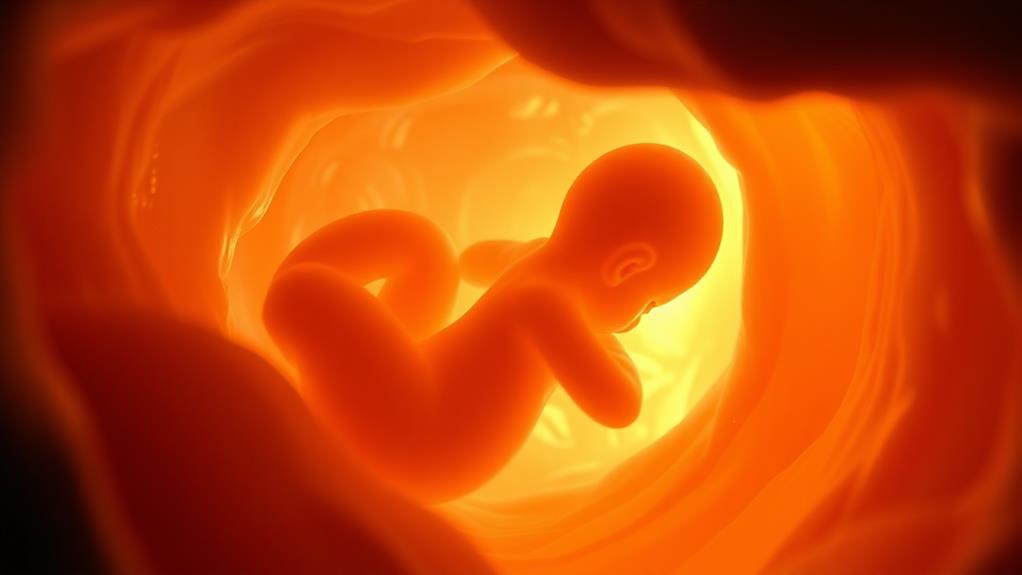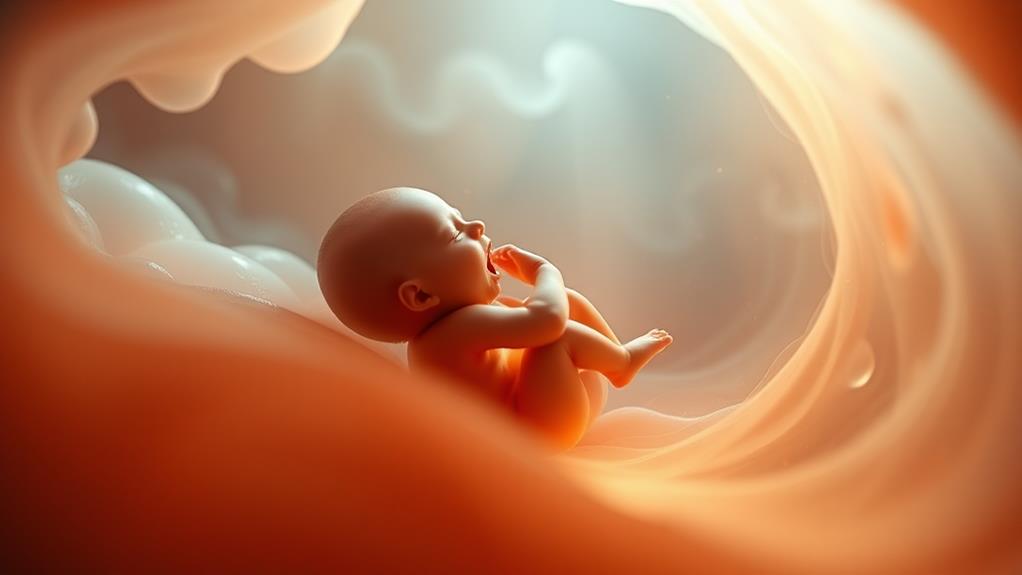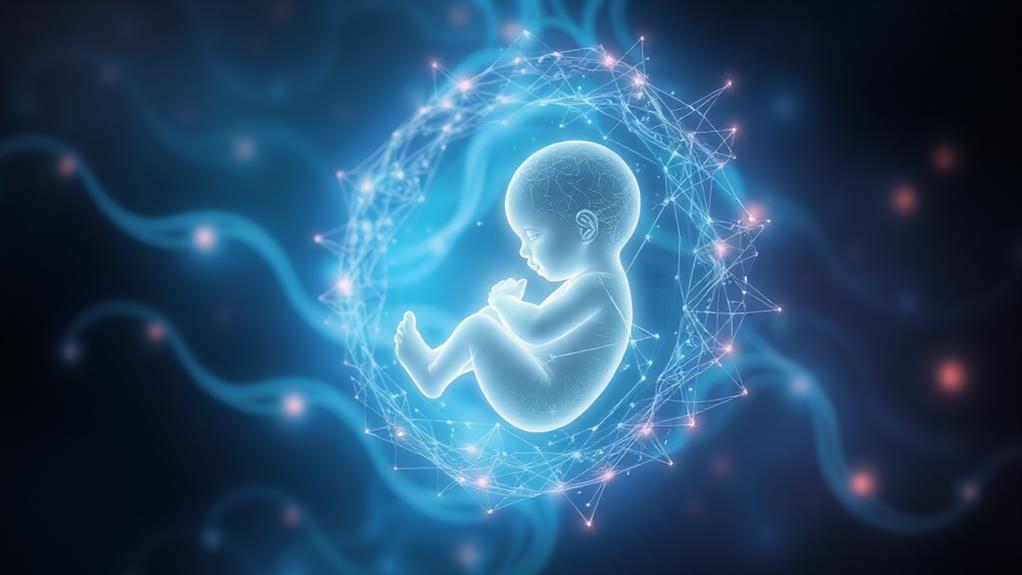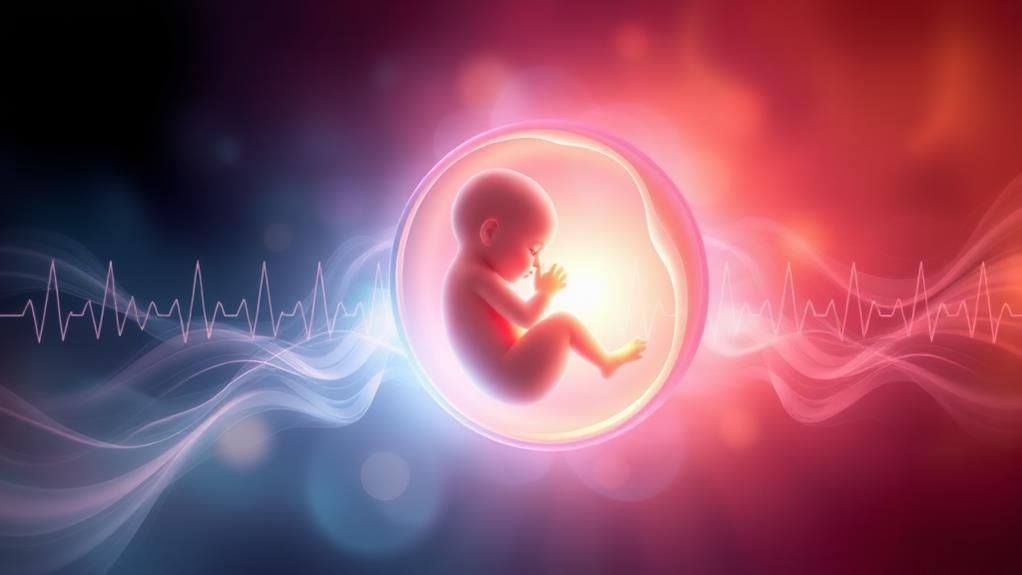17 Fascinating Secrets About Baby Behavior in the Womb
You might think of the womb as a quiet, unchanging environment for a developing baby, but it's far more dynamic than you realize. From the moment movement begins around 7-8 weeks, a range of behaviors starts to emerge that can shape a child's future. By 25 weeks, babies can hear sounds and respond to them, hinting at an intricate connection with the outside world. What influences these early behaviors? The answers might surprise you and reveal how your actions and emotions can impact your baby's development in ways you hadn't considered.
Fetal Movement Patterns

During pregnancy, you might notice your baby's movements becoming more pronounced as they develop in the womb. Those little kicks and wiggles can be pretty exciting! At first, you mightn't feel much, but as your baby grows, you'll start to feel those delightful jabs and rolls. It's like having a tiny dance partner practicing their moves!
In the early stages, your baby's movements can be sporadic and gentle. But as they get bigger, their movements become more defined, and you may start to recognize patterns. Some babies are more active during the day, while others might decide to throw a dance party at night. It's all part of getting to know your little one!
You'll also notice that certain factors can affect those movements. When you eat, drink, or even when you're relaxing, your baby can react to how you feel. If you're feeling calm, they might settle down, but if you're stressed, they could start kicking up a storm!
Keeping track of these movements can help you bond with your baby and even give you a peek into their personality before they arrive. Isn't that amazing?
Response to Sound
As your baby grows and becomes more active, they also start responding to sounds in their environment. Isn't that amazing? Around the 25th week of pregnancy, your little one can hear noises like your voice, music, and even the sound of your heartbeat. It's almost like they've got their own little concert going on in there!
When you talk or sing, your baby might wiggle or kick, showing that they're paying attention. They might even prefer certain songs! If you play a tune often, don't be surprised if they seem to recognize it later. It's like their very first taste of music appreciation.
Interestingly, babies can also hear outside sounds, like a dog barking or the doorbell ringing. While the womb muffles these noises, they can still pick up on rhythms and tones.
This means that your baby's listening skills are developing even before they make their grand entrance into the world!
Taste Preferences

Studies have found that babies might prefer the flavors they encounter in the womb.
If you regularly enjoy vegetables, your baby may be more likely to accept them later.
On the flip side, if you're all about sugary treats, your baby might lean toward those as well.
It's like you're giving them a little sneak peek into your culinary world!
Sleep Cycles
Your baby's preferences aren't just limited to taste; their sleep patterns also develop in the womb. Believe it or not, your little one starts to establish a sleep cycle even before they're born!
Around the 28-week mark, babies begin to have periods of both activity and rest. This means they might be bouncing around while you're trying to relax, and then snoozing when you're wide awake.
These tiny sleep cycles can vary. Sometimes, your baby may sleep for 20 to 40 minutes at a time, and other times, they might be awake and wiggling for a while. It's like they're practicing for their future sleep habits!
Plus, they're influenced by your daily activities. If you're active, they may feel more awake, but during quiet moments, they might settle down for a nap.
It's fascinating to think about how your baby's sleep patterns could hint at their personality. Are they going to be a night owl or an early bird? Only time will tell!
For now, just enjoy the little kicks and rolls as your tiny dreamer gets ready for the world.
Stress Reactions

While you may not realize it, your baby's reactions to stress begin to develop in the womb. That's right! Even before they're born, babies can sense when things get a little tense. Research shows that they can respond to external stressors, like loud noises or strong emotions. Isn't that fascinating?
When you experience stress, your body releases hormones like cortisol. These hormones can travel through the placenta, reaching your baby. If you're feeling anxious, your little one might kick, squirm, or even have an increased heart rate. It's like they're saying, "Hey, what's going on out there?"
You might wonder how this affects your baby. Well, while some stress is normal, too much can impact their development. It's crucial to find ways to relax and create a calm environment.
Consider listening to soothing music or practicing deep breathing.
Bonding With Parents
Often, parents underestimate how early bonding with their baby can begin, even in the womb. Did you know that your little one can hear your voice while they're still developing? That's right! When you talk, sing, or laugh, your baby picks up on those sounds. It's like having their own personal concert, and they'll learn to recognize your voice even before they're born.
You might think it's all about the physical connection, but emotional bonding matters too. When you relax and enjoy those quiet moments, your baby can sense your feelings. If you're excited, they might feel that joy, creating a happy little bubble together.
Plus, playing soothing music can help create a special bond. You're not just carrying a baby; you're nurturing a relationship!
And don't forget about those gentle touches. When you rub your belly or talk to your baby, it's like sending out love signals. Your baby can feel those vibrations and might respond with little kicks or movements.
Reaction to Light

At this stage, their eyes are still developing, but they can already detect light and dark.
By about 26 weeks, your baby's reactions become even more noticeable. They might turn away from bright lights or respond to changes in their environment. It's a fascinating dance of curiosity and instinct.
Just picture it: your little one, cozy inside, responding to your every move!
This reaction to light isn't just a fun fact; it helps lay the foundation for their vision after birth. They're practicing for the world outside, where light is everywhere.
Swallowing Amniotic Fluid
As your baby floats in the womb, they're busy swallowing amniotic fluid, an essential part of their development. This fluid isn't just water; it's packed with nutrients and helps your baby grow strong. When they gulp it down, they're practicing important skills they'll need after birth, like swallowing and digesting.
You might think, "How can they drink in there?" Well, it's all part of the amazing process of preparing for life outside!
The fluid also plays a big role in keeping your baby's lungs healthy. As they inhale the fluid, it helps their lungs develop properly. You can imagine your little one taking tiny sips, almost like having a smoothie party in your belly!
Plus, swallowing amniotic fluid helps them taste the flavors of what you eat. So, if you're munching on something spicy, don't be surprised if your baby gets a little kick from it!
Isn't it fascinating how something so simple can be so vital? Your baby is busy learning and growing, even before they take their first breath.
Hiccups and Their Meaning

You might notice your baby experiencing hiccups while they're still in the womb, and it's a common occurrence that can actually tell you a lot about their development.
These little spasms happen when your baby's diaphragm contracts, and it's just their way of practicing breathing. Isn't that cute?
Hiccups usually start around the second trimester, and you might feel them as rhythmic little thumps. Some parents even find them comforting, knowing their baby is active and growing.
While it might seem odd, hiccups are a sign that your baby's nervous system is maturing. It shows they're developing the muscles they'll eventually use for breathing after birth.
Plus, hiccups can be a way for your baby to get rid of excess amniotic fluid, just like how you might take a sip of water to clear your throat.
So, if you feel those tiny bumps, don't worry! It's perfectly normal and often a sign of a healthy baby.
Just think of it as your little one's way of saying, "Hey, I'm practicing for the big world out here!"
Sucking Reflex
Within the womb, your baby develops a fascinating sucking reflex that plays a crucial role in their growth. This reflex kicks in around the 24th week of pregnancy. You might wonder why this little habit matters so much. Well, it helps your baby prepare for life outside the womb!
When they suck, they're not just practicing for feeding; they're also working on their mouth muscles. Strong mouth muscles will help them latch onto the breast and feed effectively once they're born. Isn't that cool? It's like your baby's first workout!
You might even notice some tiny movements on your belly as your baby goes through this sucking motion. It's a sign they're getting ready for that big introduction to the world.
Interestingly, this reflex is so strong that babies can even suck their thumbs while still floating in amniotic fluid. It's a natural instinct that helps them feel secure and comforted.
Yawning in the Womb

Yawning in the womb is another fascinating behavior that can surprise expectant parents. You might think yawning is just something babies do when they're sleepy, but it actually starts much earlier. Research shows that fetuses can yawn as early as 20 weeks into pregnancy. Isn't that amazing?
When you see your little one yawn on an ultrasound, it's a cute reminder that they're developing their muscles and brain. You might wonder, why do they yawn? It's believed that yawning helps to regulate brain temperature and enhances oxygen flow. So, your baby's not just being sleepy; they're practicing important skills for life outside the womb!
Don't be alarmed if you catch glimpses of your baby yawning during check-ups. Instead, think of it as a little sneak peek into their world. It's like they're saying, "Hey, Mom, I'm cozy in here, and I'm ready for my grand entrance!"
Plus, it's a sweet moment that adds to the excitement of your pregnancy journey. So, cherish those yawns; they're just one more sign that your baby is growing and developing, preparing for all the cuddles ahead!
Impact of Maternal Diet
When it comes to your baby's development, the impact of maternal diet can't be overlooked. What you eat plays a huge role in shaping your little one's growth and behavior, even before they're born!
Think of your diet as the foundation for their future. If you're munching on a variety of fruits, veggies, and whole grains, you're providing essential nutrients. But if your meals mainly consist of junk food, it mightn't be the best choice for your baby.
Research shows that babies can taste what you eat while still in the womb. That means if you enjoy spicy foods or garlic, your baby might get a little preview of those flavors!
This exposure can shape their taste preferences later on. Plus, a balanced diet supports their brain development, which is super important for their learning and emotional well-being.
Influence of Maternal Emotions

As you navigate the emotional ups and downs of pregnancy, it's important to realize that your feelings can greatly influence your baby's development. Your little one is like a sponge, soaking up everything from your laughter to your stress.
When you're happy, your body releases feel-good hormones that can create a cozy environment for your baby. But when you're feeling anxious or upset, those stress hormones can reach your baby, too.
Imagine your baby in there, feeling all the love, joy, and even the occasional worry as you go through your day. It's like a mini rollercoaster ride!
Research shows that babies can respond to your emotions, and they may even start to show their own personality based on what they feel in the womb.
Fetal Heart Rate Variability
Fetal heart rate variability (HRV) is a fascinating indicator of your baby's well-being and development. It refers to the changes in your baby's heart rate patterns over time. When you listen to your baby's heartbeat, you're not just hearing a steady thump; you're picking up on these little fluctuations that show how your baby responds to the world inside the womb.
A healthy HRV means your baby is adapting well to different situations, like when you eat, move, or even when you're feeling a bit stressed. Think of it as your baby's way of waving hello from inside! When the heart rate is too steady, it could be a sign that your baby isn't getting enough stimulation or is feeling a bit overwhelmed.
Doctors often monitor HRV during check-ups to verify everything's going smoothly. If you're ever anxious, just remember that these little heart rate dances are normal.
Gender Differences

During pregnancy, parents might notice some intriguing gender differences in fetal behavior. Research suggests that baby boys and girls can show distinct patterns even before they're born!
For instance, studies have found that male fetuses tend to be more active than females. You might feel a lot of kicking and movement if you're expecting a little boy. Isn't that fascinating?
On the flip side, female fetuses often display more delicate movements. They might wiggle and squirm, but in a softer, gentler way. This doesn't mean one gender is better or worse, just that they've their unique styles.
Another fun fact is that boys often have a slightly faster heart rate than girls during pregnancy. It's like they're already competitive, racing to be the first one to kick!
These differences can be thrilling for parents to observe. You might find yourself wondering if these little traits will carry on into childhood.
Will your baby girl continue to be gentle, or will your baby boy be a little whirlwind? Either way, it's a delightful mystery waiting to unfold as your baby grows!
Role of Amniotic Fluid
Understanding your baby's behavior in the womb goes beyond just gender differences; the environment they grow in plays a significant role too. One of the most important parts of that environment is the amniotic fluid. You might think of it as your baby's personal swimming pool! This fluid is vital for a lot of reasons.
First, it cushions your baby, protecting them from bumps and jolts. It's like a cozy blanket that keeps them safe. The fluid also helps regulate temperature, keeping your little one comfy and warm.
Plus, it's not just a passive pool; your baby actually swirls around in it, practicing movements and getting stronger. Those little kicks and punches you feel are a sign of their growing muscles!
Interestingly, amniotic fluid also carries flavors from the foods you eat. So, when you munch on an apple or a spicy taco, your baby gets a taste too! This can even shape their preferences after they're born.
Memory Formation in Utero

Memory formation in utero is a fascinating process that many expectant parents mightn't consider. Your baby starts learning even before they take their first breath! Research shows that by around 25 weeks, fetuses can recognize sounds, including your voice and music.
Imagine your little one bobbing along to your favorite tunes while still cozy in the womb!
As your baby listens to the world outside, they're not just hearing; they're forming memories. When they hear familiar sounds repeatedly, like your laughter or the rhythm of your heartbeat, they start to connect those sounds with feelings of comfort.
Isn't that amazing?
After birth, babies often respond to these familiar sounds, showing they remember what they heard in utero. So, if you've been singing or talking to your bump, you might just be the star of the show when your baby arrives!
While you're busy preparing for your little one, don't forget that your interactions matter. Play some music, read a story, or just chat away.
It's not just bonding; it's memory-making! Who knew you were creating a little library of sounds for your baby before they even entered the world?














Post Comment